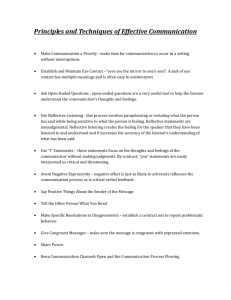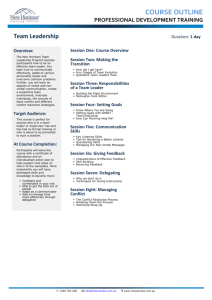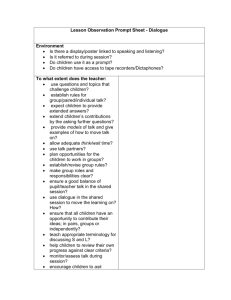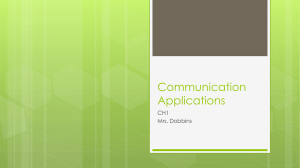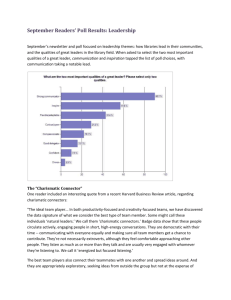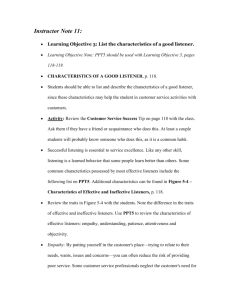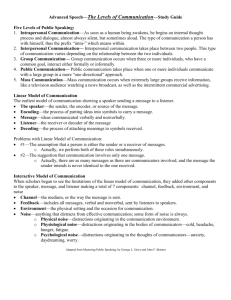Com Final doc
advertisement
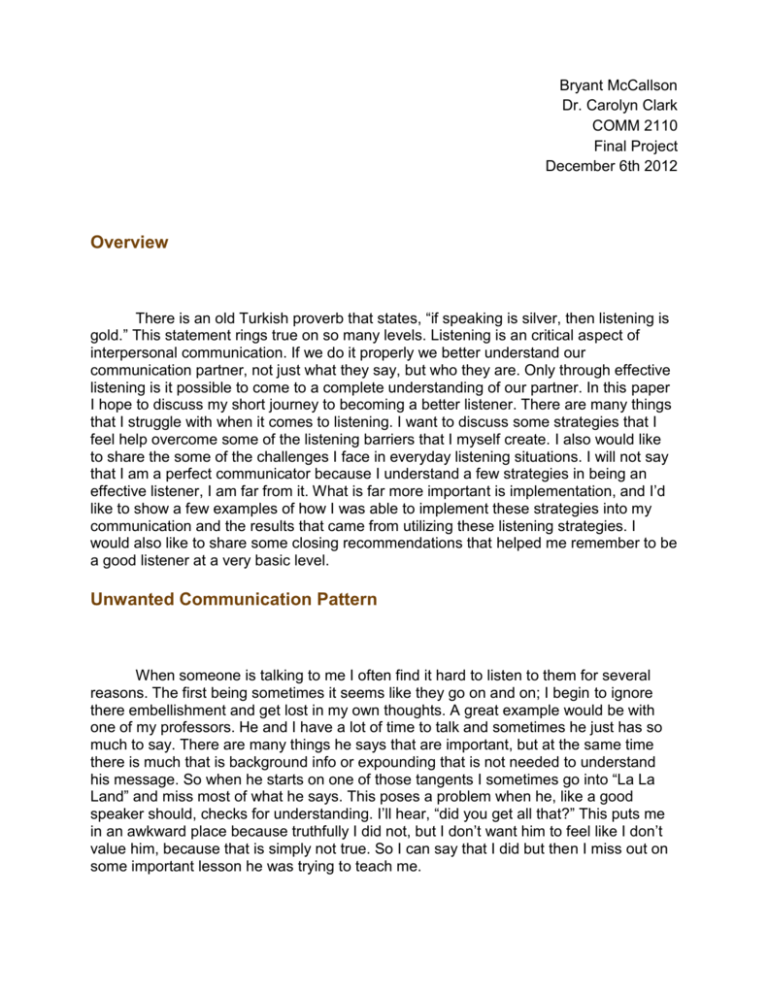
Bryant McCallson Dr. Carolyn Clark COMM 2110 Final Project December 6th 2012 Overview There is an old Turkish proverb that states, “if speaking is silver, then listening is gold.” This statement rings true on so many levels. Listening is an critical aspect of interpersonal communication. If we do it properly we better understand our communication partner, not just what they say, but who they are. Only through effective listening is it possible to come to a complete understanding of our partner. In this paper I hope to discuss my short journey to becoming a better listener. There are many things that I struggle with when it comes to listening. I want to discuss some strategies that I feel help overcome some of the listening barriers that I myself create. I also would like to share the some of the challenges I face in everyday listening situations. I will not say that I am a perfect communicator because I understand a few strategies in being an effective listener, I am far from it. What is far more important is implementation, and I’d like to show a few examples of how I was able to implement these strategies into my communication and the results that came from utilizing these listening strategies. I would also like to share some closing recommendations that helped me remember to be a good listener at a very basic level. Unwanted Communication Pattern When someone is talking to me I often find it hard to listen to them for several reasons. The first being sometimes it seems like they go on and on; I begin to ignore there embellishment and get lost in my own thoughts. A great example would be with one of my professors. He and I have a lot of time to talk and sometimes he just has so much to say. There are many things he says that are important, but at the same time there is much that is background info or expounding that is not needed to understand his message. So when he starts on one of those tangents I sometimes go into “La La Land” and miss most of what he says. This poses a problem when he, like a good speaker should, checks for understanding. I’ll hear, “did you get all that?” This puts me in an awkward place because truthfully I did not, but I don’t want him to feel like I don’t value him, because that is simply not true. So I can say that I did but then I miss out on some important lesson he was trying to teach me. Another challenge I face is that there are so many things competing for my attention that I miss out on critical things being said. This is known as noise. “Noise is anything that interferes with a message and keeps it from being understood.” (Beebe, 2008, pg. 9) There is a lot of noise in my home. I often find myself on the computer browsing the web and listening to music, somebody else is watching TV and there is a conversation going on all in the same room. When somebody comes up and talks to me I get so distracted by all the things going on that I’m lucky if I get a third of what they said. I am left with only a small amount of needed information and have to figure out a way to get the rest or manage without it. The final challenge I’d like to address is a matter of pride. It is a huge hindrance to being an effective listener. I’m sure we have all been guilty of this at some point. Sometimes I honestly just do not understand what the person is trying to say to me, but I want them to think I am intelligent and an effective communicator, so I say that I understood even when I didn’t. This doesn’t help me or the speaker. It just creates disappointment when I fail to do as they asked and embarrassment for me. This is obviously a problem that needs to be addressed. Strategies There are many things that we can do to become effective listeners, but I think that the most basic thing is to recognize what kind of communicator we are as well as what kind our partner is. There are four basic types of communicators, found in Interpersonal Communication: Relating to Others, people-oriented, action-oriented, content-oriented and time-oriented. 1. People-oriented listeners are very empathetic. They listen to other people and strive to understand them on a personal level. They understand the thoughts and feelings of others. Basically they listen to feel a connection with the other person. (Beebe, 2008, pg.129) I am an adequate people-oriented listener, but I only really use it when a loved one comes to me with a problem. 2. Action-oriented listeners prefer information to be organized. They like their partner to get straight to the point. To them communication should be efficient and error free. We’d prefer to cut though all the embellishment and get to the point (Beebe, 2008, pg. 129) I feel that for the most part, especially when receiving instruction, I am this kind of listener. I hate talking on the phone I just want people to tell me why they called, say bye and hang up. 3. Content-oriented listeners are comfortable listening to complex information. They like the little details and focus on them. When speech is vague they are less likely to accept what the speaker is saying. (Beebe, 2008, pg.129-130) If you have read J.R.R. Tolkien he was probably this kind of communicator. His books are filled minute details and he goes on forever painting his picture with words. I love the books but they can be tedious for me at points because I am not this type of listener at all. 4. Time-oriented listeners are acutely aware of the time that they have to speak with you. They like their messages quick and to the point. Unlike an action-oriented listener it is because they feel that they have other things to do and not just because that is how they like their information. (Beebe, 2008, pg.130) I would not say that I am often this type of listener. I like my messages to the point but it is rarely because I feel that I have other pressing matters. When we can recognize what kind of listener we are and what kind our partner is we can adapt our speech or implement other listening skills to be effective in a range of scenarios. We can select what our listening style would be based on whom we are speaking with. (Beebe, 2008, pg.130) When someone is droning on and on it is important to recognize the differing speech to thought rate. We think a lot faster than people can speak and we can utilize the speed of our thoughts to focus on the content of the message and relating it to ourselves rather than thinking about other things that are on our minds. (Beebe, 2008, pg.134) As an action-oriented listener this is very important for me. I can use this to pick out what I need to know and evaluate what they are saying all whilst they are speaking. This allows me to discard information that I do not need and to access and assess critical information others are sharing with me. Another strategy is to remove external noise from my conversations if at all possible. I will try to focus on multiple things and fail. I am not good at multi-tasking. By turning off the TV, Computer or Radio I can better control my listening environment and avoid information overload. I need to remove distractions so that I will be able to avoid shifting my attention when I should be listening. Simply making eye contact can help minimize external noise. (Beebe, 2008, pg.135-136) When we have so much going on we can get lost in it all. It makes it so much easier to listen to others when we get away from all the other attention getters and it really shows them that we value them more than anything else we could be doing right now. This will help us to form more meaningful and deep relationships with those that we care about, as well as make them value us more as a communication partner and person. Finally we can paraphrase and ask questions to make sure that we have understood what was communicated effectively. If there is any error in communication this allows the listener to express it and the speaker to clarify. Through paraphrasing and asking questions we can really come to a mutual understanding. (Beebe, 2008, pg. 140) I feel that if we can use this we will also be focused on the communicator so we know what to paraphrase or how to ask a thought provoking question. For me it is important to realize that while I may feel like I look stupid paraphrasing or asking a question that it will be far more embarrassing when the person asks me why I failed them. Constraints I feel that when it comes to listening the hardest thing is just to remember what you need to do in order to be the most effective listener. There are many strategies that talked about and it is hard to always remember them. Especially in unplanned conversations. It was just a challenge to make that conscious effort to apply all of these strategies in listening scenarios. A big worry for me was that I wouldn’t be able to identify what kind of oriented communicator they would be. action, people, context or time? When you understand what kind they are you can mentally prepare yourself for conversation with them and adjust what you say and how you listen to fit the scenario. If you can’t figure it out then you are going to have trouble. Another Challenge I faced was external noise that I have no control over. Sometimes there are distractions that I just can’t do anything about and they are sometimes really hard to deal with. They can render communication useless unless they are properly addressed. Implementation The biggest challenge in implementation of these strategies was just remembering them and consciously making an effort to use them. At first what I had to do was read them from my personal change proposal and study them. This helped cement the strategies in my head so I could use them in conversation. For the first while I could not implement the difference in speech to thought to analyze what the speaker was saying because I was using that difference in time to think about how to use the other strategies. After I got better at recognizing what type of communicator they were, paraphrasing and asking questions, I was able to implement the difference in speech to thought analyze what they said. It takes a huge amount of conscious effort at first but with practice you think about it less and less until it becomes second nature. It is important to go back and assess how you did though because I often found myself slipping back into old habits. At first I had a really hard time figuring out what orientation of communicator they were. I just had couldn’t figure it out especially with new people. It is really hard to just place that kind of label on a person especially when I know that I’m not always an action-oriented communicator. Then I decided to instead of trying to assign them an attribute I would compare them with someone who I knew was a certain type. For example: when talking with a girl who just met I thought to myself “she is talks a lot like my step-dad I bet she is a people-oriented communicator.” I was then able to focus the conversation more on feeling rather than information. Or I’ll compare them to my mother who is action-oriented or my grandmother who is content-oriented. This so far has worked really well and I can quickly assess what I need to do to communicate best with them. Finally removing external noise. At first I was just concerned with myself. If I was on the computer and my dad started talking to me I would turn away from the computer, mute my music and make eye contact. This helped tremendously and it was very simple to do, but I was still getting distracted by other things going on. Like the TV show my little brother was watching. In some situations I found it best to remove the conversation from the noise. It was a little awkward at first but the best way I found to do this was to ask to change location to a more appropriate one, or to ask if we could talk about it at a more appropriate time. Results I am so pleased with the outcome of this assignment. I feel that I have really made great strides to becoming a better listener. I still make mistakes in these arias and I am far from perfect in many other arias of communication as well. I feel that all of the strategies I implemented from the text worked marvelously. The text for the class is very simple and easy to implement. I often return books after I use them for a class, but I really want to hang on to this one because it has so much that really matters to me. Communication is something that happens everyday and it is unavoidable so I might as well get as good at it as I can. Recommendations I plan to continue working on the strategies that I have implemented over the course of this assignment. I often after a conversation remember that I missed to do something. I go back and think about how I could have used it how it might have changed the conversation. It is ok to make mistakes. The most important thing is that we recognize them and use them to help us better ourselves. I really want to build upon the principles I learned in this course. For example, along with what I have already accomplished with my listening skills, I know I sometimes have a problem being a Self absorbed listener. I will get excited by something someone else said and cut them off and run them over with what I want to say about the topic. It is a really bad habit and it has honestly hurt some of my relationships. I will add that to my list of strategies and make a conscious effort to better myself in that regard. Works Cited Beebe et al. (2008). Interpersonal Communication: Relating to Others. Boston: Pearson [Allyn & Bacon]. Turnitin.com ID Number: 290514922
